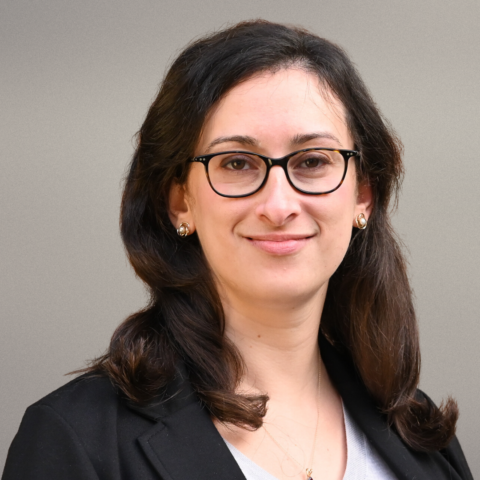
The British-funded Partnerships for Forests (P4F) marked the program’s closure with a special closing ceremony in Nairobi, Kenya on 21 March 2024, the International Day of Forests. As program partners since 2022, GCP participated to share results, reflect on the journey with P4F, and to celebrate the progress made to embed regenerative and agroforestry practices into the coffee value chain in East Africa.
The journey to championing agroforestry for coffee farmer resilience and prosperity in East Africa reached a critical milestone this month with the formal closeout of the current phase of Partnerships for Forests (P4F). The eight-year-long program aimed at combatting deforestation, funded by the UK Foreign, Commonwealth, and Development Office. GCP partnered over the past year to embed regenerative and agroforestry practices into the coffee value at the intersection of farmer prosperity and agroforestry in Uganda, Kenya and Tanzania. This collaboration enabled groundwork for the GCP Country Plans for Farmer Prosperity in Uganda and Kenya by strengthening forest protection as part of sustainable coffee farming and enhancing governance structures at the national and regional levels.
In her remarks Leigh Stubblefield, Deputy High Commissioner and Development Director, British High Commission acknowledged a great sense of pride with “what this program has achieved by working in partnership with business, civil society, and government across East Africa. There is much more to be done and we’re delighted to be launching a second phase of forestry projects in the near future.”
Reflecting this sentiment, P4F East Africa Regional Director, Feker Tadesse, said collaboration was at the heart of P4F. “We’re very grateful for every person in East Africa who has contributed to the partnerships that have driven our results. One million hectares of forest has been protected and restored, and that’s all down to the cooperation between businesses, government, investors, civil society, and critically, forest communities.”
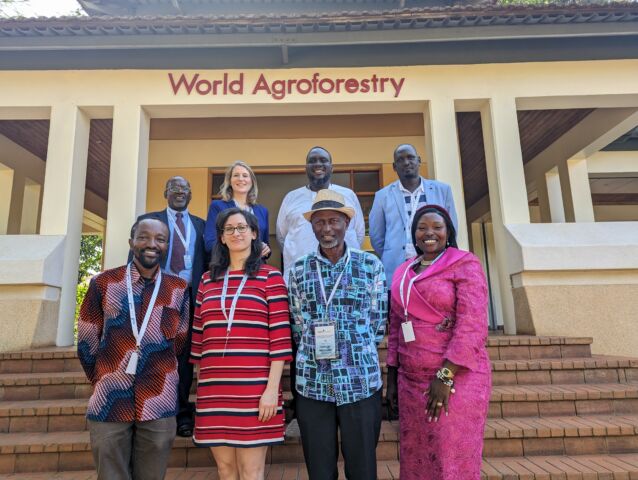
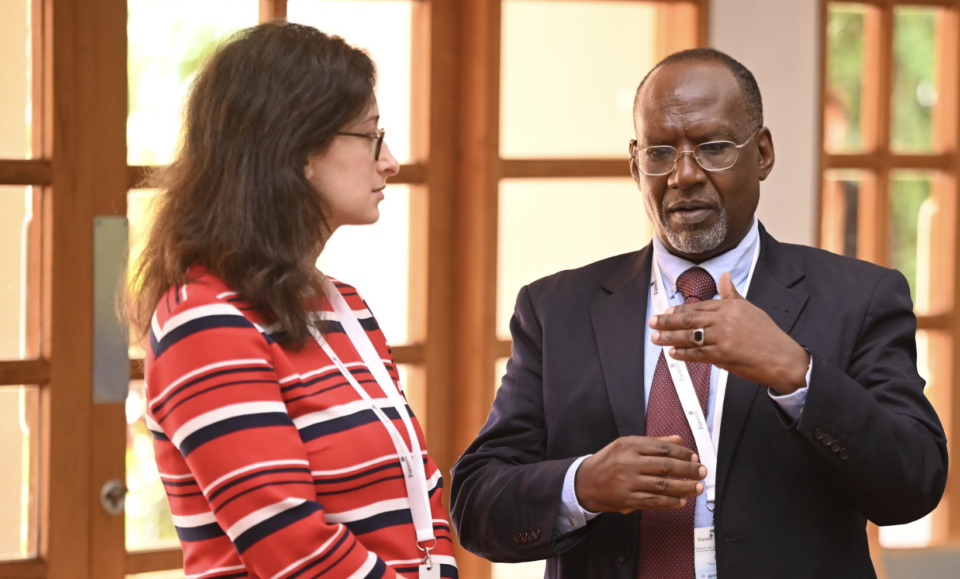
The GCP team and Kenya Coffee Platform are pictured at the event.
A farmer-centric partnership
GCP’s partnership with P4F began in 2022, in which the program funded some of the work of three National Coffee Sustainability Platforms (Country Platforms) – Kenya, Tanzania and Uganda, including piloting actions to foster a stronger enabling environment for agroforestry in Kenya and Uganda.
Amongst the positive results, opportunities and key learnings from the partnership, Annette Pensel, GCP Executive Director, highlighted the need for new forms of collective action grounded in farmer prosperity.
“GCP is focused on advancing collective action on coffee sustainability. Much like P4F’s belief in collaboration, GCP brings a diverse group of coffee stakeholders from private, public and third sectors together to align agendas and create a common language on coffee sustainability and farmer prosperity.”
“Farmers need to see the potential to continue coffee farming, sustainable coffee farming that includes agroforestry here in East Africa, and to pass it on to the next generation. Without their participation and motivation we will not achieve our shared vision of a thriving and sustainable coffee sector. Despite billions having been invested in coffee sustainability in the past decades, our sector is still confronted with smallholder poverty leading to social and environmental issues, aggravated by climate change and biodiversity loss. To overcome systemic challenges that hinder progress, we need new forms of collective action and co-investments to achieve collective impact at scale.”
Pensel spoke to the overall transformation of the coffee sector, local ownership and moving beyond single sustainability issues at both national and global levels. Scale can be achieved by pooling public and private resources differently through collective action and a shared responsibility for coffee sustainability that supports transition of current farming systems to resilient and sustainable ones, complemented by increasing the market demand for sustainable coffee.
“To achieve such transformational change, innovation and partnerships are key. I’m pleased with the results of the successful partnership between GCP and P4F which allowed to lay the groundwork on the intersection of farmer prosperity and agroforestry in East Africa. Additionally, it helped to build awareness and led to coordinated actions on EUDR at national levels. We’re looking forward to deepen and scale the work in Uganda, Kenya and Tanzania, and expand it to further countries as next steps.”
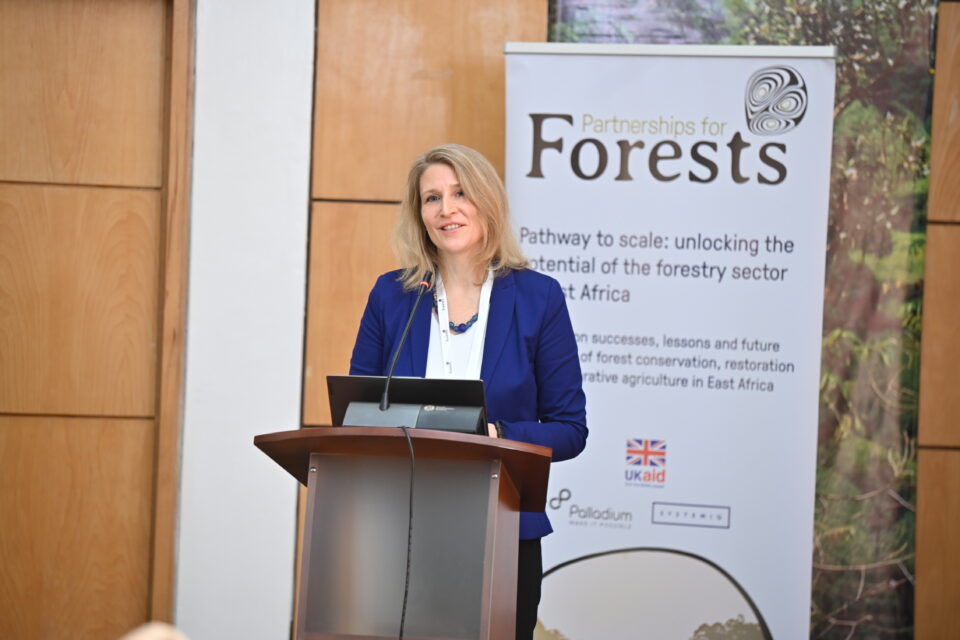
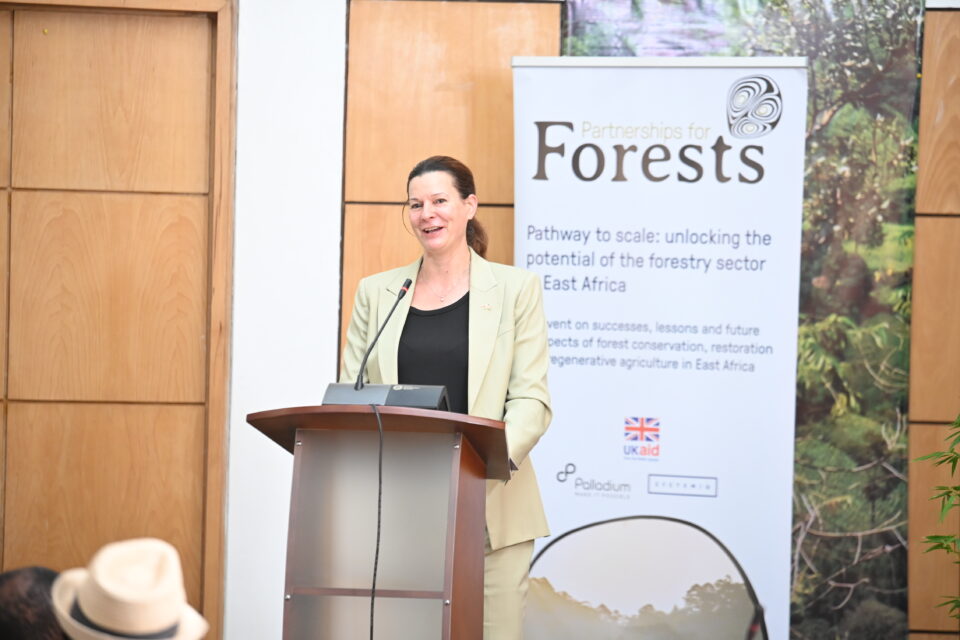
Annette Pensel (left) gives the keynote address at the special event held in Nairobi, Kenya to celebrate the closeout of the first phase of Partnerships for Forests. Leigh Stubblefield, Deputy High Commissioner and Development Director, British High Commission is pictured on the right.
A fluid approach
For Samson Emong, Country Coordinator in Uganda, the partnership with P4F transformed the approach to one of the GCP Collective Action Initiatives together with Café Africa: Ugandan Youth for Coffee.
“For the last two years we have changed the way we operate. The beauty of our GCP Collective Action is that it is very fluid; the way we embedded agroforestry into the work has moved from being just an integration but to being the core of the work.”
Some of the results emerging from this work, which was co-funded by P4F, included community-wide impact as 5 of the 26ha Gomba Forest Reserve was restored – a number expected to increase. Training materials and knowledge sharing events were held, with three agroforestry working committees established as part of the Uganda Coffee Platform, more than 90 youth trained, and 9,000 farmers enrolled to receive agroforestry services.
George Watene, GCP’s Program Manager for Kenya, shared insights from the work done in Kenya through the partnership which included an update of the country’s National Sustainability Curriculum for coffee to include agroforestry and regenerative agriculture, a list of recommendations for intercropping and a revised strategy for the Kenya Coffee Platform to include climate change and agroforestry.
Equally engaging were the stories from the field where a pilot was run in Kenya’s Nyeri Country that saw 50 youth become trainers of trainers and the development of nurseries for seedling distribution and income generation – both coffee and recommended agroforestry trees.
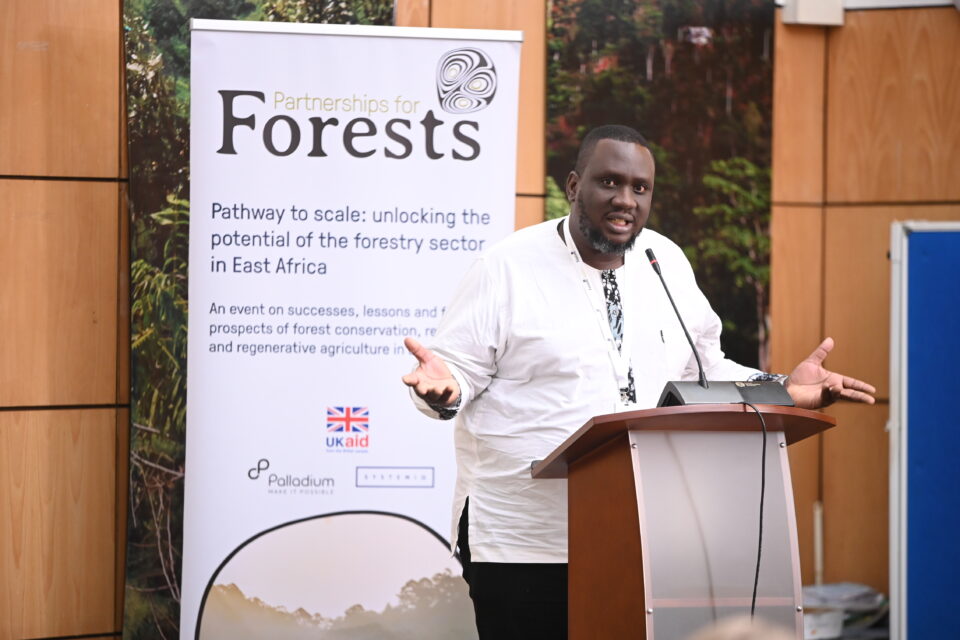

GCP’s Samson Emong, George Watene and Lauren Weiss presented on the lessons learnt through the partnership with P4F in East Africa and beyond.
Short term results with long term scaling potential
In giving closing remarks and a reflection of some of the success factors, Lauren Weiss, GCP Program Manager Countries and Partnerships, highlighted again that multi-stakeholder work was key for transformational change of the coffee sector at large. “Without the buy-in from government and other actors across the value chain, new initiatives will never graduate out of the pilot/testing phase,” she said, adding that this is connected to the importance of reinforcing the local ownership of the Country Platforms at neutral convening bodies for these policy discussions to take place and bring together various stakeholders in the coffee value chain.
“This is because from the nature of their set up they are multi-stakeholder bodies they play a crucial and often invisible role of convening and aligning the sector and sharing learning and best practices for sector-wide transformation.”
Another takeaway from the GCP-P4F collaboration was to ensure long-term sustainability of our efforts: “We must always ground interventions in how they economically benefit the smallholder farmers – for example how restoration, agroforestry or forest protection helps improve famers’ net income. Without this, activities won’t be sustainable after donor funding ends.”
“This is why GCP focuses on farmer economic prosperity as the key underpinning element to foster environmental and social sustainability – and why the P4F-GCP partnership focused on the nexus of farmer prosperity and environmental protection.”
While the event celebrated the eight years of P4F, the GCP team was able to reflect specifically on the latter stages where significant achievements were the result of a partnership that only existed for about 18 months – an impressive feat!
“This partnership was a great first step for improving sustainable coffee in East Africa,” said Weiss, “but much more work is needed. We look forward to a further partnership with P4F to scale up impact here in East Africa and beyond through GCP’s Network of Country Platforms”.
